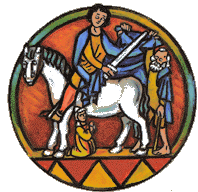O Jesus, sent to bring good news
To poor and broken hearts to bind,
We praise you that in ev'ry age
You bring forth shepherds great and kind.
Saint Martin, once a soldier brave,
Became a soldier of your cross,
Renouncing force, embracing peace,
Rejecting wealth as useless dross.
As bishop, Martin taught the Faith
With constancy and gentle zeal,
And the way he led his flock,
Proved to the world God's grace was real.
Concern for lowly, helpless folk
Was in the forefront of the task;
"What's done to least is done to me!"
The poor we help are Christ in mask.
